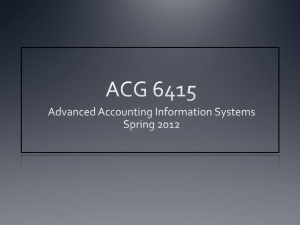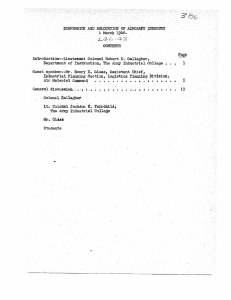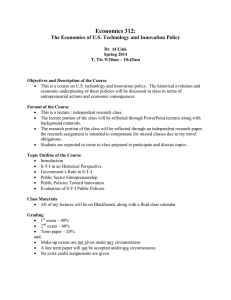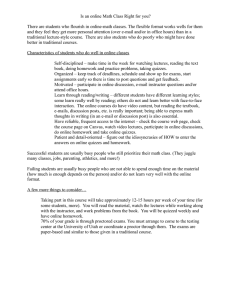THE UNIVERSITY OF NORTH CAROLINA AT GREENSBORO Professor
advertisement
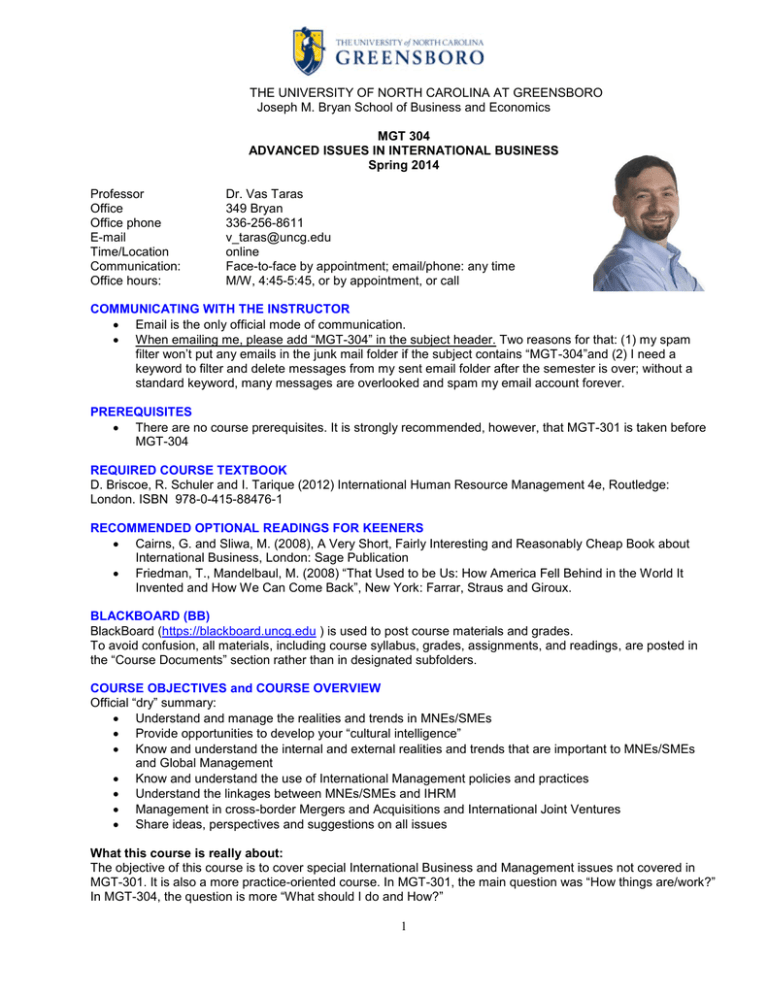
THE UNIVERSITY OF NORTH CAROLINA AT GREENSBORO Joseph M. Bryan School of Business and Economics MGT 304 ADVANCED ISSUES IN INTERNATIONAL BUSINESS Spring 2014 Professor Office Office phone E-mail Time/Location Communication: Office hours: Dr. Vas Taras 349 Bryan 336-256-8611 v_taras@uncg.edu online Face-to-face by appointment; email/phone: any time M/W, 4:45-5:45, or by appointment, or call COMMUNICATING WITH THE INSTRUCTOR Email is the only official mode of communication. When emailing me, please add “MGT-304” in the subject header. Two reasons for that: (1) my spam filter won’t put any emails in the junk mail folder if the subject contains “MGT-304”and (2) I need a keyword to filter and delete messages from my sent email folder after the semester is over; without a standard keyword, many messages are overlooked and spam my email account forever. PREREQUISITES There are no course prerequisites. It is strongly recommended, however, that MGT-301 is taken before MGT-304 REQUIRED COURSE TEXTBOOK D. Briscoe, R. Schuler and I. Tarique (2012) International Human Resource Management 4e, Routledge: London. ISBN 978-0-415-88476-1 RECOMMENDED OPTIONAL READINGS FOR KEENERS Cairns, G. and Sliwa, M. (2008), A Very Short, Fairly Interesting and Reasonably Cheap Book about International Business, London: Sage Publication Friedman, T., Mandelbaul, M. (2008) “That Used to be Us: How America Fell Behind in the World It Invented and How We Can Come Back”, New York: Farrar, Straus and Giroux. BLACKBOARD (BB) BlackBoard (https://blackboard.uncg.edu ) is used to post course materials and grades. To avoid confusion, all materials, including course syllabus, grades, assignments, and readings, are posted in the “Course Documents” section rather than in designated subfolders. COURSE OBJECTIVES and COURSE OVERVIEW Official “dry” summary: Understand and manage the realities and trends in MNEs/SMEs Provide opportunities to develop your “cultural intelligence” Know and understand the internal and external realities and trends that are important to MNEs/SMEs and Global Management Know and understand the use of International Management policies and practices Understand the linkages between MNEs/SMEs and IHRM Management in cross-border Mergers and Acquisitions and International Joint Ventures Share ideas, perspectives and suggestions on all issues What this course is really about: The objective of this course is to cover special International Business and Management issues not covered in MGT-301. It is also a more practice-oriented course. In MGT-301, the main question was “How things are/work?” In MGT-304, the question is more “What should I do and How?” 1 The course will revolve around two blocks of questions faced by people doing business internationally: 1. I am going overseas (as an employee, manager, or entrepreneur) or sending my employee overseas: a. Why would you want to go there? b. Where would you go and why? c. What do I need to do to go? d. How will I handle my personal finance and banking issues? e. How will I handle my company finance and banking issues? f. How do I settle, integrate and be happy there? g. How do I recruit, hire, evaluate, compensate, and fire people there? h. Returning back: now what? 2. I want to hire a foreigner to work for me here or invite a business partner to visit me here: a. Why would I want to hire a foreigner? b. Where would I look for employees/business partners overseas? c. What would it take to get them here? d. How doing business internationally (foreign employees, partners) affect my company (taxes, reporting, etc.) e. It’s not going well, how do I get out of this arrangement? COURSE FORMAT This is an online course. Instructor Students - All materials will be posted on BB (syllabus, slides, exam reviews at the beginning of the semester, other materials as we move along) - To match your personal learning style, all course content will be available in text, video and audio format. This way, you can read, watch or listen to the lectures – whatever fits your lifestyle. - The textbook contains the most detailed information, but the slides are deliberately made wordy so that they provide enough information to comprehend the material and be used for a quick but thorough review and preparation for tests. Students Instructor - There will be two non-cumulative exams and six take-home assignments. Students Instructor - For two-way communication, I will hold optional virtual office hours and exam review sessions. - You are also welcome to stop by my office or call me: I am in most of the days from about 8 am till about 5 pm. POWER POINT PRESENTATIONS (PPTs) The PPTs are posted on BB, by chapter. Given that this is an on-line course, I deliberately designed them to be wordy so that slides resemble a textbook rather than just offer a bullet list of issues covered in the presentation. This way, PPTs could be used not only as a technological enhancer of my presentations, but also as a supplement to or a condensed version of the textbook. Unlike the traditional brief “issue list” slides, my wordy “textbook” slides could be comprehended by students or used for a quick yet thorough and detailed review of the course materials before the exam. I constantly strive to improve the slides, thus updates are possible. Check for an updated version before each class and before exams. Substantial changes are very unlikely, but I may include additional examples or better explanations of the concepts. VIDEO AND AUDIO LECTURES For those of you who prefer a face-to-face contact, there are video lectures that will be posted on BB as we are moving along. While video lectures cannot fully replace true in-class lectures, this is as close as we can get in an on-line course to face-to-face interaction (multi-user video conferences don’t work well if the number of users is more than 10). Most importantly, video lectures can be viewed at your convenience so you don’t have to alter your schedule to attend real-time lectures. For those of you who prefer to study while you commute to work, jog, workout in the gym, or work in the garden, there are audio lectures that will be posted on mp3 format on BB. Likewise, all readings will be available 2 in audio format (some files recorded by my former students, some are created with help of text-to-speech software). Should you watch/listen to the video/audio lectures? I would say yes, you should. Although the textbook does a great job explaining the materials and my slides are detailed enough to fully understand the material, the video/audio lectures provide even more information and would be beneficial if you want to learn more and prepare better for the homework assignments and exams. Moreover, to encourage you to review the video/audio lectures, I incorporated 3 sample questions in each lecture. The format and difficulty of these questions are similar to those you will see on the exam in terms of format and difficulty. These sample questions will not be shared in the text-format materials (not included in the text-only slides, only in video/audio lectures). LETTER GRADE SCALE* 97 and up A+ 94 – 96 A 91 – 93 A87 – 90 B+ 84 – 86 80 – 83 76 – 79 70 – 75 B BC+ C 65 – 69 61 – 64 50 – 60 0 – 49 CD+ D F COURSE GRADE COMPOSITION* Exam 1 (covers materials from chapters 7, 8, 9): 35 Exam 2 (non-cumulative, covers materials from chapters 6, 10, 11, 12): 35 6 THAs, 5% each 30 Total: 100 Course improvement bonus (more details below), 0.1 per idea/correction, 1 max “Green question bonuses, up to 0.25 points per chapter, up to 1.5 total: Theoretical course maximum: 1 1.4 102.4 * To translate numeric grades into letter grades, final grades will be rounded to the nearest integer (no decimals). The grades are posted in an Excel file on BlackBoard in section “Course Documents.” An Excel file, rather than the BlackBoard’s grade center is used as Excel gives students more flexibility (shows grade distribution, allows to “play” with the numbers to determine what grade is needed on the remaining exams to receive a desired course grade, etc.). The file is regularly updated, usually shortly after each lecture. The date in the file name shows when it was updated the last time. EXAMINATIONS There will be two non-cumulative exams. Each exam will include only multiple-choice questions. The exams will be posted on BB and will be made available as per the schedule provided at end of this document. TAKE-HOME ASSIGNMENTS (THAs) The third portion of the semester will be devoted to a review of some of the most controversial issues in international business; things like immigration, job outsourcing, or free market vs. planned economy comparison. You will be provided with a short (15-17 min) video on each of the topics and then asked to lay out the arguments of each side in the debate. You will not be asked to share your own opinion and will not be evaluated based on your own views. You will just need to know what each side has to say. There is actually a good chance you will be much less confident about your stance on the issue after you have learned more about it. You will learn that many of these issues are not black and white, not the absolute good and evil, but rather shades of grey. THA grading procedures Since completion of THA’s is not timed, it is expected that your answers are nearly perfect (all relevant points identified, no irrelevant points included, clear, to the point). Generally, answers to each THA question will be rated as - excellent (full credit for the corresponding question), 3 - good (half credit for the corresponding question), or poor (zero credit for the corresponding question). COURSE IMPROVEMENT SUGGESTIONS, 0.1 PER READING UP TO 1 POINT TOTAL To improve course quality, bonuses will be given for suggestions on how this course could be improved, such as Corrections of grammar errors and poor wording in the slides, THAs, and this syllabus. Just email me the correction and I will give you a 0.1 bonus per correction – believe me, there are enough of them in the course documents. Suggestions for course assignments, exam questions, activities, etc. (up to 1 point). To receive a bonus, students must present well developed alternative assignments, test questions, or the like, with instructions and suggested grading scheme. Links to relevant news stories, videos, and other resources, 0.1 points per relevant link. DEFERRING EXAMS OR ASSIGNMENTS Deferring exams or assignments may be allowed in cases of illness, domestic affliction, religious conviction or emergencies. Proper documentation must be submitted. ACADEMIC ACCOMMODATION The Disability Resource Services provide accommodations to students with documented disabilities. It is the student’s responsibility to request an academic accommodation. I will be happy to accommodate in any possible way. HONOR CODE By virtue of registering for this course, students must conform to all existing principles found in UNCG’s Academic Integrity Policy and the Student Code of Conduct. Further details may be found at the following sites: http://academicintegrity.uncg.edu/complete/; http://studentconduct.uncg.edu/policy/code/ You are required to know and abide by the Honor Code in all matters concerning this course. Please submit all written work with the word “Pledged” followed by your signature indicating that you prepared the work in accordance with the Honor Code and in accordance with any other specific instructions relevant to that assignment. This pledge will also indicate that you have not used information (oral or written), materials, or briefs prepared by or given by current or former students in my classes or students in other classes or online paper-writing services. Violations of the Honor Code will be severely prosecuted. FACULTY – STUDENT GUIDELINES The Bryan School has adopted a set of faculty and student guidelines. Please read them at: www.uncg.edu/bae/faculty_student_guidelines.pdf 4 TENTATIVE COURSE SCHEDULE, SUBJECT TO CHANGE - CHECK FOR UPDATES FREQUENTLY!!! Color code: Red – Exams, assignments due Green – Main questions for the lecture, submit answers for bonus Timing Topic Week 1 Jan 13-19 Introduction Details Review Course materials. No assignments. Video Introduction to be posted Thursday, January 16 Video Lecture http://youtu.be/-8ZZnULcy4Y Week 2 Jan 20-26 Ch. 7 International Employee Relations “Green” question bonus (submit via BB, 1 page/question max), 0.1 points: How does labor union membership vary around the world? How unions can affect operations of MNEs? Unionization rate is on the rise in China. Is it good or bad for China and why? Video Lecture: http://youtu.be/5wHGAh5fOF4 Week 3 Jan 27-Feb 2 Ch. 8 International Workforce Planning and Staffing “Green” question bonus (submit via BB, 1 page/question max), up to 0.1 points: Why is planning and forecasting a global workforce so difficult? If Yum Yum were to open a fully-owned restaurant in China, of the international assignment options listed on pp. 210-212, which 3 would be most suitable for Yum Yum and why? What are the trends over the next decade in global staffing for many MNEs? Video Lecture: http://youtu.be/FUQLXfOyELI http://www.metacafe.com/watch/10852648/mgt_304_ch_9_video_lecture/ Week 4 Feb 3- 9 Ch. 9 International Recruitment, Selection, and Repatriation Exam Exam 1 Week 5 Feb 10- 16 Ch. 10 International Personnel Training and Development “Green” question bonus (submit via BB, 1 page/question max), up to 0.1 points: What recruitment methods that are popular in the US may not work or may not be available in China? Why? When recruiting a person for international assignment, what qualities will you be looking for in the candidates and why? How will you assess whether or not the candidate has the qualities listed above? Chapters 7, 8, 9 Exam window: Thu, Feb 6, 11:59 am – Sun, Feb 9, 11:59 am 35% of the total course grade Video Lecture: Part 1: http://youtu.be/DDufgtctr6c Part 2: http://youtu.be/jnlPvp-3DSA “Green” question bonus (submit via BB, 1 page/question max), up to 0.1 points: What are the challenges of training an international workforce? If you were going on an international assignment, what kind of training would you like to receive? How would you measure whether or not the training was successful? 5 Video lecture: http://youtu.be/dAr1fR_YJmo Week 6 Feb 17-23 Week 7 Feb 24-Mar 2 Week 8 Mar 3-9 Ch. 11 International Compensation, Benefits and Taxes Ch. 6. International employment Law, Labor Standards, and Ethics Ch. 12 Performance Management “Green” question bonus (submit via BB, 1 page/question max), up to 0.1 points: What are the differences between global remuneration and international assignment compensation? How are equity compensation plans affected when used as incentive compensation with employees from different countries in an MNE? What are the advantages and disadvantages of the common international assignment compensation systems? What different tax approaches can be used by MNEs for international assignment compensation? Video Lecture: To be posted after Exam 1 “Green” question bonus (submit via BB, 1 page/question max), up to 0.1 points: Pro’s and con’s of different legal systems What supra-national organizations do you know that affect international business operations, and what each of them does? What are the main differences in employment visa regulations across countries? What are the main difference in employee protection, benefits, and termination across countries? Video Lecture: To be posted after Exam 1 “Green” question bonus (submit via BB, 1 page/question max), up to 0.1 points: What are some of the international differences in employee feedback management? How the definition and understanding of “employee performance” differs across cultures? How “performance”, “success”, and “failure” are usually defined in the context of expatriation? Exam Exam 2 Chapters 6, 10, 11, 12 Exam window: Thu, Mar 6, 11:59 am – Sun, Mar 9, 11:59 am 35% of the total course grade Week 9 Mar 10-16 Spring Break Spring Break. Don’t drink and drive. Video Lecture: To be posted after Exam 2 The Big International Business Controversies: Job Outsourcing Following exam 2, you will be provided with a set of materials (lecture slides, video lecture, optional regains) and asked to prepare a take-home assignment (THA) based on the materials. Week 10 Mar 17-23 Job outsourcing The main questions you will have to answer will include: - Why the debate on the economic effects of job outsourcing? - Main arguments of the proponents of immigration? - Main arguments of the proponents of immigration? - Proposed ways to deal with the issue? You will not be asked to provide your opinion, just the list of main arguments with your review of truths and myths behind each of them. The THA will be available on BB after the second exam. 5% 6 Video Lecture: To be posted after Exam 2 The Big International Business Controversies: Immigration Week 11 Mar 24-30 Following exam 2, you will be provided with a set of materials (lecture slides, video lecture, optional regains) and asked to prepare a take-home assignment (THA) based on the materials. If you took my MGT-301, the format will be very similar to my regular THAs. Immigration The main questions you will have to answer will include: - Why the debate on the economic effects of immigration? - Main arguments of the proponents of immigration? - Main arguments of the proponents of immigration? You will not be asked to provide your opinion, just the list of main arguments with your review of truths and myths behind each of them. The THA will be available on BB after the second exam. 5% The Big International Business Controversies: Of Course I should Make My Decisions, or should I? Week 12 Mar 31-Apr 6 International Differences in Decision Making You will be asked to watch this video: TED: Sheena Iyengar, The art of choosing http://youtu.be/lDq9-QxvsNU Based on the video, you will be given a THA that asks you: - Basic views and assumptions about decision making in the West - Basic views and assumptions about decision making in the East - What it all means for international management? The THA will be available on BB after the second exam. 5% The Big International Business Controversies: Of Course Free Market is Better than Planned Economy, or is it? You will be asked to watch this video: TED: Eric X. Li, A tale of two political systems http://youtu.be/s0YjL9rZyR0 Week 13 Apr 7-13 Free Market is Better than Planned Economy, or is it? Additionally, a review of pro’s and con’s of Free Market, vs. Planned Economy systems will be provided to you in a form of a video lecture and slides. Based on these materials, you will be given a THA that asks you: - Arguments of the proponents of the free-market system? - Why there are many people on this planet who genuinely believe free market is not the optimal system, at least not always – and their arguments? You will not be asked to provide your opinion, just the list of main arguments with your review of truths and myths behind each of them. The THA will be available on BB after the second exam. 5% 7 The Big International Business Controversies: A gap between the rich and the poor is good, or is it? You will be asked to watch this video: Chrystia Freeland: The Truth About the Growing Income Gap http://youtu.be/tt8uG5XFdKM Week 14 Apr 14-20 Difference between rich and poor is good, or is it? Based on the video, you will be given a THA that asks you: - A brief historic review on income inequality: where we’ve been, where we are, how the trends looks like - Arguments of those who believe the government should not engage in income re-distribution - Arguments of those who believe the government should not engage in income re-distribution You will not be asked to provide your opinion, just the list of main arguments with your review of truths and myths behind each of them. The Big International Business Controversies: The World is Flat, or is it? You will be asked to watch this video: TED: Actually, the world isn’t flat, Pankaj Ghemawat http://youtu.be/KPNn880KWfU Week 15 Apr 21-27 The World is Flat, or is it? Based on the video, you will be given a THA that asks you: - Why the debate? - Arguments of the proponents of the “flat world”? - Counter-arguments presented in the video? - What does it all mean for IB? The THA will be available on BB after the second exam. 5% 8

